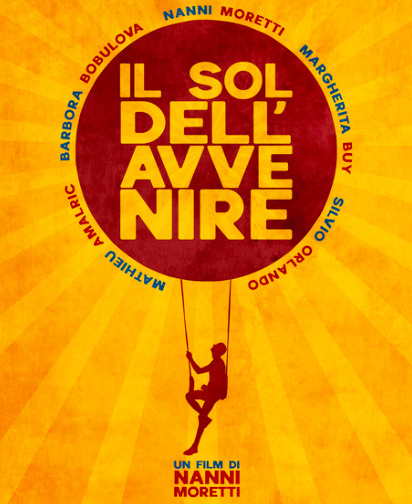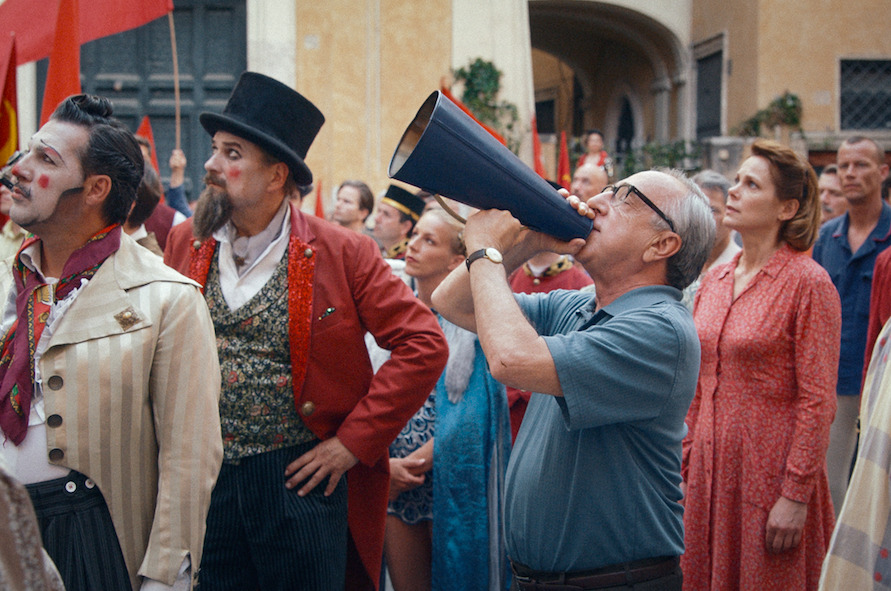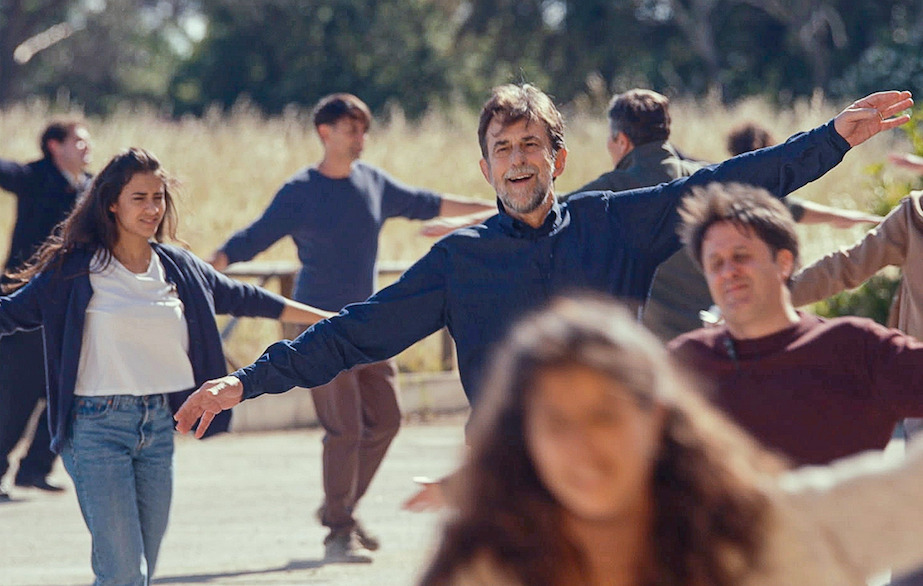
Nanni Moretti’s new film Il Sol Dell’Avvenire, in competition at the 76th Cannes Film Festival, is a compelling journey through the director’s themes such as cinema, communism, therapy, romantic problematics, family issues, and observations on society. His habitual and irresistible sardonic style — that was temporarily dispersed in his previous film Three Floors (Tre Piani) — returns through playful banter with a sparkly touch of wonderment.
The story takes place in the present day, when director Giovanni (Nanni Moretti) with the help of his wife Paola (Margherita Buy) is busy making his latest film, set in the Fifties with the characters of Ennio (Silvio Orlando) and Vera (Barbora Bobulova) who follow the Hungarian Uprising. Fiction splendidly interweaves with realism as Giovanni’s daughter (Valentina Romani) falls in love with an improbable Polish man (Jerzy Stuhr) and outrageous circumstances occur on set, showing also the advent of Korean investors in the film industry.
In terms of cast, Il Sol Dell’Avvenire, includes French actor Mathieu Amalric — playing the maladroit co-financier of Giovanni’s film — as well as Elena Lietti Laura Nardi, Beniamino Marcone, Rosario Lisma, Blu Yoshimi, Flavio Furno and Francesco Brandi. In the very last sequence there are some surprise appearances of performers who previously worked with the Italian filmmaker.

The picture travels on multiple narrative levels, as Giovanni’s personal life intertwines with his artistic dimensions: the one he is developing and the ones he imagines. Besides the film he is shooting — about an editor of the broadsheet L’Unità and his seamstress wife who witness the upheavals in Budapest — Giovanni has other projects on his mind. He ponders upon a film adaptation of the short story The Swimmer by John Cheever, about a man who decides to swim across his county through his friends’ pools. And he craves to make a movie filled with Italian songs, about the misfortunes of a couple from their first kiss to the following fifty years. Despite his cantankerous and know-it-all facade, Giovanni is a dreamer at heart who declares: “I want to make history with ifs!”
The meta-cinematographic world presented by Il Sol Dell’Avvenire, is a clear homage to Federico Fellini’s world, not just with a nod to Intervista in the opening credits or the inclusion of a sequence from La Dolce Vita, but even through the circus-realm to which Moretti gives his own personal twist. The “Circusz Budavari” shares the name with the Hungarian water polo champion who played himself in the 1989 film Palombella Rossa. There are plenty of self-references in Moretti’s fourteenth feature. If in the film Bianca his sweet-tooth was expressed through a giant jar of Nutella, in his latest film he picks a very specific type of ice-cream. Furthermore, in the poster of Sogni d’oro Nanni Moretti can be seen with a hand-knit cover that he also uses in Il Sol Dell’Avvenire. Another detail that sparks attention is how the filmmaker who made the Vespa iconic in his Caro Diario, swaps it (only on the silver screen) with a scooter, as he wanders around the Mazzini neighbourhood at night, with the character played by Mathieu Amalric who praises his approach by telling him: “Your film is a subversive film.”

On the other hand, filmic references are made to the works of other directors, unleashing the cinephile soul of Nanni Moretti. There is a mention to Demy’s Lola, Kieślowski’s A Short Film About Killing and Florian Zeller’s The Father starring Anthony Hopkins. Make believe and truth become one, as Moretti’s onscreen alter-ego voices out his true feelings. For instance he admits: “I don’t think about the public…actually I like to say that I don’t think about it.”
The Roman filmmaker never ceases to be intellectually incendiary when confronting social phenomena. The entertainment in Il Sol Dell’Avvenire comes from plenty of new sources that provide a farcical and fierce commentary on current culture, such as streaming networks and the way blockbusters bank upon gratuitous violence. Moretti peppers it all with the personal pet peeves of his character, like sabot shoes, and paradoxical situations that are used to reinforce his ideology. One of these involves unexpected cameos of illustrious members of the boot-shaped land, that have nothing to do with the world of motion pictures. In order to prevent spoilers, let us simply mention the professions of these enlightened Italians: an architect, a mathematician and a journalist-historian.
In his latest work Nanni Moretti also gives a touch of musical, a genre to which he has shown a liking in the past with the famous scene in his film Aprile of the Trotskyite pastry chef in the Fifties. In Il Sol Dell’Avvenire there are various choral moments in which everyone stops their activities and starts singing in unison; the most enticing of all is when they whirl like a group of dervishes. Music is something that Nanni Moretti pays great homage to in this feature, with songs by Franco Battiato (Voglio Vederti Danzare), Luigi Tenco (Lontano lontano), Fabrizio De André (La canzone dell’amore perduto) Aretha Franklin (Think), and even Noemi (Sono solo parole).
But above all, as an outspoken leftist he doesn’t cease to remind younger generations of the political scenarios and figures that have been influential in the history of Italy. In Il Sol Dell’Avvenire the cinematic inquiry begins from the title (that translates to “The sun of the future”), which refers to the bright future that awaited the workers when socialism was achieved. It is a typical metaphor of the Italian Communists of the twentieth century, that was first used by Giuseppe Garibaldi.
Nanni Moretti’s latest film is cerebral, whimsical, and unorthodox beyond what he has directed before. He expresses his distinctive style and simultaneously evolves towards a more self-critical and oneiric sphere, that will beguile viewers. As Moretti says: “Cinema helps us think about reality, but it also helps us dream and if dreams come true, it’s better to dream about beautiful things.”
Final Grade: A+

